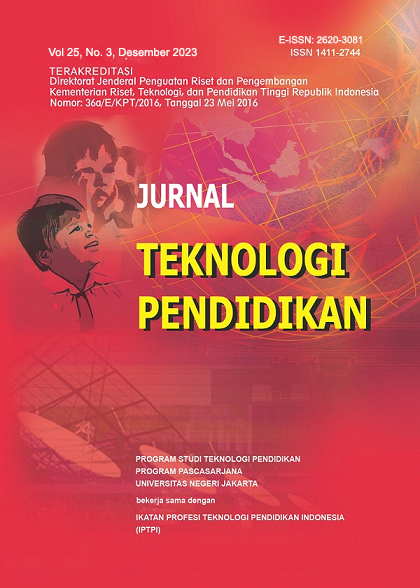Development of an Interactive Ebook to Improve Cultural Literacy and Citizenship in Class VIII Junior High School Students
DOI:
https://doi.org/10.21009/jtp.v25i3.41583Keywords:
interactive ebooks, cultural literacy and citizenship, junior high school studentsAbstract
Cultural and civic literacy is one of the important literacies for junior high school students to have. The aim of this research is to develop an interactive ebook that can increase cultural and civic literacy in class VIII students. The research method uses the Richey and Klein model, namely Research, Design, Production and Evaluation. The participants in this research consisted of seven students and one class VIII teacher at CLC SMPT Lumadan Beaufort, Sabah, Malaysia. The data analysis technique uses quantitative descriptive analysis techniques. The research results show that based on the results of the media validator and ebook material validator it is very valid to be used as a learning medium. Based on the results of the pretest and posttest, there was an increase in students' cultural and civic literacy results. This proves that the interactive ebook created is effective and efficient. Effective because it can increase cultural literacy and citizenship in class VIII students significantly and efficiently because it does not require a long time in the improvement process, namely within one month after using the product in classroom learning.
References
Beers, C.S., Beers, J.W., Smith, J.O. (2009). A Principal’s guide to literacy instruction, New York: Guilford Press.
Budiharto, Triyono, Suparman. (2020). Literasi sekolah sebagai upaya penciptaan masyarakat pebelaajr yang berdampak pada peningkatan kualitas pendidikan. Seuneubok Lada: Jurnal Ilmu-ilmu Sejarah, Sosial, Budaya dan Kependidikan, 5(1), 153-166.
Dirjen Dikdasmen Kemdikbud. (2018). Desain induk gerakan literasi sekolah. Jakarta: Dirjen Dikdasmen Kemdikbud.
Fangestika, D. (2018). Pelaksanaan gerakan literasi di sekolah dasar, Jurnal Pendidikan Guru Sekolah Dasar, 35(7), 3.501-3.508.
Fathoni, M.I., Marpanaji, E. (2018). Pengembangan e-book interaktif mata pelajaran Teknologi Informasi dan Komunikasi (TIK) untuk SMK kelas X, Jurnal Inovasi Teknologi Pendidikan, 5(1), 70-81. https://doi.org/10.21831/jitp.vhttps://doi.org/10.21831/jitp.v5i1.17149
Makdis, N. (2020). Penggunaan ebook pada era digital, Al-Maktabah, 19(1), 77-84. http://doi.org/10.15408/almaktabah.v19il.21058
Mardin, S., Ramadhan, A., & Ismail, M. (2022). The Development of an Ebook with Learning Management System to Improve Student’s Metacognition Ability. EST Journal of Educational Science and Technology, 8(1), 35-43. https://doi.org/10.26858/est.v8i1.30947
Oxfordditionaries.com. (2023, 1 September). E-book. https://www.oxfordlearnersdictionaries.com/definition/english/e-book?q=ebook
penerbitbukudeepublish.com. (2021, 21 Juni). Pengertian Ebook: Fungsi, Tujuan, Format, dan Cara Membuat Buku. https://penerbitdeepublish.com/pengertian-ebook/
Prihantoro, C.R. (2018). Pengaruh e-readiness, e-learning dan e-book pada implementasi kurikulum Program Studi D3 Teknologi Mesin terhadap prestasi lulusan program diploma, Jurnal Teknologi Pendidikan, 20(2), 105-119. https://doi.org/10.21009/jtp.v20i2.8619
Ramandanu, F. (2019). Gerakan literasi sekolah (GLS) melalui pemanfaatan sudut baca kelas sebagai sarana alternatif penumbuhan minat baca siswa, Jurnal Mimbar Ilmu, 24(1), 10-19. https://doi.org/10.23887/mi.v24i1.17405
Richey, R.C., Klein. J.D. (2009). Design and development research: methods, strategies and issues, Mahwah, New Jersey: Lawrence Erlbaum Associates Publishers.
Riduwan. 2011. Belajar Mudah Penelitian untuk Guru, Karyawan dan Peneliti Pemula. Bandung: Alfabeta
Risky, F., Rahmayanti, P., Molinda, R., Ramadani, S., Dafit, F. (2023). Keterlaksanaan Program Literasi SD MI Muhajirin Duri, Jurnal Insan Pendidikan dan Sosial Humaniora, 1(3), 10-14. https://doi.org/10.59581/jipsoshum-widyakarya.v1i3.702
Santoso, T.N.B., Siswandari, Sawiji, H. (2018). The Effectiveness of eBook versus Printed in the Rural Schools in Indonesia at the Modern Learning Era. International Journal of Educational Research Review, 3(4), 77-84. https://doi.org/10.24331/ijere.453512
Saraswati & Sridiyatmiko, G. (2021). Implementasi gerakan literasi sekolah dalam pembentukan karakter peserta didik, Jurnal Sosialita, 15(1), 127-140.
Sari, S.Y., Rahim, F.R., Sundari, P.D., & Aulia, F. (2021). The Importance of e-Books in Improving Students’ Skills in Physics Learning in the 21st Century: a Literature Review. Journal of Physics: Conference Series, IOP Publishing, 2309, 1-8. https://doi/10.1088/1742-6596/2309/1/012061
Sukardi. (2021). Analisa minat membaca antara e-book dengan buku cetak menggunakan metode observasi pada Politeknik Tri Mitra Karya Mandiri, Jurnal Ikraith-Ekonomika, 4(2), 158-163. https://doi.org/10.37817/ikraith-ekonomika.v4i2.1029
Suprapto, E., Apriandi, D., Pamungkas, I.P. (2019). Pengembangan e-book interaktif berbasis animasi bagi siswa Sekolah Menengah Kejuruan, Anargya: Jurnal Ilmiah Pendidikan Matematika, 2(2), 124-130. https://doi.org/10.24176/.v2i2
Suryani, E., Khoiriyah, I.S.A. (2018). Pemanfaatan e-book sebagai sumber belajar mandiri bagi siswa SMA/SMK/MA, International Journal of Community Service Learning, 2(3), 177-184. https://doi.org/10.23887/ijcsl.v2i3.15422
Wandasari, Y. (2017). Implementasi Gerakan Literasi Sekolah (GLS) sebagai pembentuk pendidikan berkarakter. Jurnal Manajemen, Kepemimpinan dan Supervisi Pendidikan, 1(1), 325-343. https://doi.org/10.31851/jmksp.v2i2.1480
Us, K.A., Mahdayeni. (2019). Penggunaan e-learning, e-book, e-journal dan sistem informasi pendidikan Islam di Universitas Sriwijaya Palembang, Innovatio: Journal for Religious-Innovation Studies, XIX(1), 43-64, https://doi.org/10.30631/innovatio.v19i1.81
Downloads
Published
How to Cite
Issue
Section
License
Jurnal Teknologi Pendidikan is an Open Access Journal. The authors who publish the manuscript in Jurnal Teknologi Pendidikan agree to the following terms.
Attribution-ShareAlike 4.0 International (CC BY-SA 4.0)
-
Attribution — You must give appropriate credit, provide a link to the license, and indicate if changes were made. You may do so in any reasonable manner, but not in any way that suggests the licensor endorses you or your use.
-
ShareAlike — If you remix, transform, or build upon the material, you must distribute your contributions under the same license as the original.
- No additional restrictions — You may not apply legal terms or technological measures that legally restrict others from doing anything the license permits.
Notices:
- You do not have to comply with the license for elements of the material in the public domain or where your use is permitted by an applicable exception or limitation.
- No warranties are given. The license may not give you all of the permissions necessary for your intended use. For example, other rights such as publicity, privacy, or moral rights may limit how you use the material.








